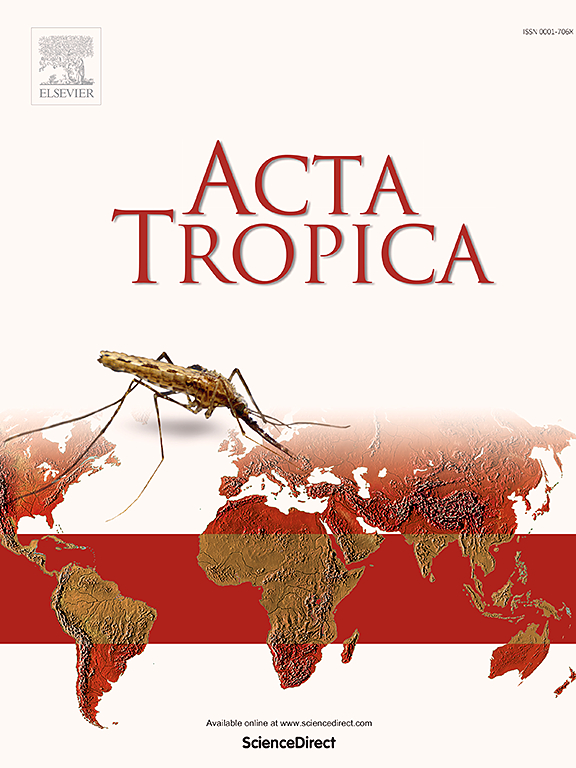The effect of artificial cold selection on the behaviour and immune response of the major malaria vector Anopheles arabiensis (Diptera: Culicidae)
IF 2.1
3区 医学
Q2 PARASITOLOGY
引用次数: 0
Abstract
The physiological response of mosquitoes to cold is poorly understood, particularly for Anopheles mosquitoes, where overwintering is rarer than in Aedes and Culex. The effect of cold selection was examined in two laboratory strains of the major malaria vector An. arabiensis that differ in insecticide resistant phenotypes. This is due to previous studies that demonstrated an increased tolerance for high temperatures in insecticide resistant An. arabiensis. The insecticide unselected SENN strain and the insecticide-resistant SENN-DDT strain were reared at decreasing fluctuating temperatures for three generations until adults emerged at 18°C. Adults from this generation was exposed to 18°C and 25°C and their longevity compared to unselected counterparts. Furthermore, their landing and biting behaviour at 20 and 25°C were assessed. Finally, the expression of the antimicrobial peptides Attacin, Cecropin, Defensin and Gambicin was assessed. The cold selection had variable effects on the two strains. Cold selection significantly increased adult female longevity at 18°C in SENN-DDT but not SENN. By contrast, cold selection increased landing at 20°C in SENN but not SENN-DDT. However, it decreased biting success at 20°C in both strains. Cold treatment increased Attacin and cecropin expression in both strains but had no effect on Defensin and Gambicin expression. This study suggests that winter survival in An. arabiensis is associated with increased longevity and reduced feeding success. Increased antimicrobial peptide activity was generally observed under cold conditions. These factors combined may contribute to reduced transmission of Plasmodium under winter conditions, over and above the low population density.

人工冷选择对主要疟疾媒介阿拉伯按蚊行为和免疫反应的影响
人们对蚊子对寒冷的生理反应知之甚少,特别是对比伊蚊和库蚊更罕见越冬的按蚊。对两种主要疟疾病媒安的实验室菌株进行了冷选择试验。在抗杀虫剂表型上不同的Arabiensis。这是由于先前的研究表明,耐杀虫剂的安对高温的耐受性增强。arabiensis。将未选择杀虫剂的SENN菌株和耐杀虫剂的SENN- ddt菌株在波动温度逐渐降低的条件下饲养三代,直到在18°C条件下羽化成虫。这一代成人暴露在18°C和25°C环境中,与未选择的同龄人相比,他们的寿命更长。此外,还评估了它们在20°C和25°C下的着陆和咬伤行为。最后,检测抗微生物肽Attacin、Cecropin、Defensin和Gambicin的表达。冷选择对两个菌株的影响是不同的。低温选择显著增加了SENN- ddt在18°C下的成年雌性寿命,而SENN没有。相比之下,冷选择增加了SENN在20°C下的着陆,但没有增加SENN- ddt的着陆。然而,在20°C时,它降低了两株菌株的咬伤成功率。冷处理增加了两株菌株中atacacin和cecropin的表达,但对防御素和冈比星的表达没有影响。这一研究表明,安山的冬季生存。Arabiensis与寿命增加和摄食成功率降低有关。在低温条件下,抗菌肽活性普遍增加。这些因素加在一起可能有助于在冬季条件下减少疟原虫的传播,超过低人口密度。
本文章由计算机程序翻译,如有差异,请以英文原文为准。
求助全文
约1分钟内获得全文
求助全文
来源期刊

Acta tropica
医学-寄生虫学
CiteScore
5.40
自引率
11.10%
发文量
383
审稿时长
37 days
期刊介绍:
Acta Tropica, is an international journal on infectious diseases that covers public health sciences and biomedical research with particular emphasis on topics relevant to human and animal health in the tropics and the subtropics.
 求助内容:
求助内容: 应助结果提醒方式:
应助结果提醒方式:


